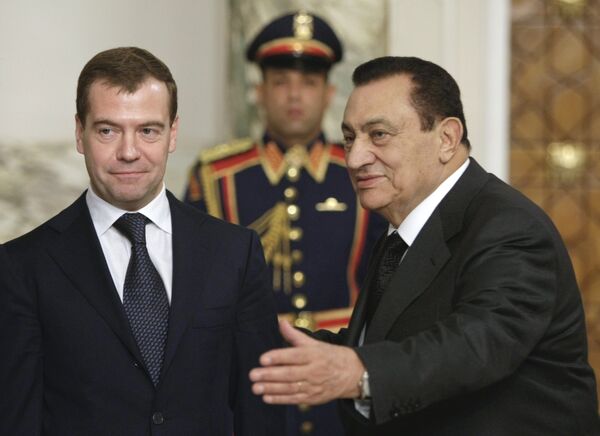MOSCOW. (RIA Novosti commentator Maria Appakova) - Although the documents Russian President Dmitry Medvedev is signing during his first and therefore historic visit to Africa may be important, the highlight of his tour was his speech at the Arab League headquarters in Cairo. It is important not so much for Russia's African policy as for its Mideastern policy.
Russian leaders seldom present their vision of the Middle East process in such detail. Even though President Medvedev's speech did not contain any ground-breaking initiatives, the very fact that the speech was presented is unusual. It brought to mind the Cairo visit three weeks earlier by U.S. President Barack Obama and his speech at Cairo University.
Moscow claims that Medvedev's speech cannot be seen as Russia's answer to the U.S. because his visit to Egypt and its agenda had been agreed before Obama went to Cairo. Still, it is impossible not to compare the two visits, the two leaders of great powers, their first visits to the Middle East, their behavior and their speeches.
Although neither the Russian nor the American leaders unveiled any sensational initiatives but simply reiterated the well-known positions of their countries on the Middle East process, Medvedev's speech did not create anything like the stir caused by Obama's speech. But that is only natural.
President Obama came to Cairo to mend fences with the Islamic world, especially the Arabs. After the Iraq war and the dismal failure of America's policy on Palestine, after all the hostile rhetoric of the Bush era, Obama had to regain the confidence of the Middle East and the Islamic world as a whole. He had been speaking about it since his inauguration and he reaffirmed his position in Cairo. America is open to the Islamic world, it is part of this world - this was more or less his message.
President Medvedev, too, said that Russia was part of the Islamic world. "Millions of Muslims have lived in Russia for centuries in peace and harmony with their neighbors, a part of the 160 peoples and ethnic groups and more than fifty religious communities. Islam is an inseparable part of Russian history and culture. Respect for faith, customs and traditions of our peoples is the foundation for civil peace in our country. I want to be clear: Russia has no need to seek friendship with the Muslim world. Our country is an organic part of this world because 20 million of our citizens are Russian Muslims," he said.
The words are very similar to what Obama said in referring to American Muslims. But the sentence that merits attention is "Russia has no need to seek friendship with the Muslim world," a direct hint at the US because it was friendship, or rather, mutual understanding with the Islamic world, that Obama came to Cairo for. He promised to fight the negative cliches about Islam in the United States and in return asked the Muslims to reconsider their attitude toward America.
In a way, the situation in the U.S. today is similar to that in which Russia was in the mid-1990s when the Chechen war demanded a maximum effort from Moscow to prevent the collapse of the friendship with the Arab world that had been shaken after the break-up of the USSR.
It was not easy to explain that Russia was not fighting Islam in Chechnya. To this day some, though not many, people in the Arab world think so.
The Arab elites and leaders understood Russia's problem and supported it. That was what President Medvedev thanked them for in his address at the Arab League in Cairo: "For our part, we in Russia remember that in the 1990s, when our country was living through difficult times, the Arab world came out in support of our country's territorial integrity. We seek to preserve the traditions of cooperation, and to continue to develop ties with the Arab League states."
In Cairo Medvedev was welcomed as an old friend whose virtues and faults are well known, while Obama was treated with caution and the hope for change. Even so, everyone in the Middle East knows that Russia's role in the region is secondary to America's. Still, Moscow may be able to restrain Washington in some matters, coordinate and frame the general approach of mediators of the Middle East settlement in the UN and the Madrid Quartet. It has an important, although not the decisive role. That is why everything coming from Washington, even if it contains nothing new, is in for scrutiny.
The Arab League held a special session on Obama's Cairo speech the day after President Medvedev visited the Arab League. This is a symbolic coincidence. Moscow is simply not expected to come up with anything fundamentally new. People expect Obama (not the U.S., but Obama personally) to pressurize Israel and moderate the U.S. policy in the Middle East.
The Russian policy in the Middle East cannot be more balanced than it already is. The question is what will happen if Moscow and Washington coordinate the principles of their Middle East policies. Will it make a difference for the region or merely gain plaudits for the presidents' speeches?
The opinions expressed in this article are the author's and do not necessarily represent those of RIA Novosti.



